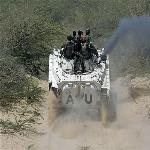March 28, 2011

Photo: AP
African Union peacekeepers in Somalia patrol in a tank as they assist Somalia government forces during clashes with Islamist insurgents in southern Mogadishu, Somalia, March 9, 2011
As pro-government troops continue their push to oust Islamist insurgents from southern and central Somalia, Uganda and Burundi have pledged additional troops to reinforce the African Union peacekeeping mission.
It has been slightly more than a month since the Somali government launched an offensive against the al-Qaida-linked insurgent group al-Shabab. While fighting has subsided in some areas, clashes continue throughout the Gedo region - along the borders of Kenya and Ethiopia - and in the capital, Mogadishu.
With the government claiming significant gains as a result of the fighting, the defense chiefs of both Uganda and Burundi were in Mogadishu last week to assess the progress of the transitional federal government, as well as the African Union mission in Somalia, known as AMISOM.
AMISOM maintains a force of about 8,000 Ugandan and Burundian troops that are based primarily in Mogadishu. Late Saturday, AMISOM revealed that both countries had pledged an additional 4,000 troops to strengthen the mission.
Transitional Federal Government (TFG) and AMISOM forces control only parts of Mogadishu. The spokesperson for the Ugandan People's Defense Force, Felix Kulayigye, told VOA the additional troops would assist government efforts to retake the city.
"With the additional manpower we shall see the Transitional Federal Government being strengthened or given capacity to have more control over the city, and therefore allow it to build capacity to bring peace and stability in that country," said Kulayigye.
The addition of the 4,000 AMISOM troops meets a December request by the UN Security Council to bring the force to 12,000 soldiers. A battalion of about 1,000 Burundian troops was deployed earlier this month and the rest of the reinforcements are expected later this year.
The 12,000 AU troops expected in Somalia will provide a significant boost to the beleaguered peacekeeping force, but the number falls far short of the 20,000 the African Union estimated to be necessary at the start of the mission.
Kulayigye repeated an earlier pledge by Ugandan President Yoweri Museveni to provide the remaining troops if supported by the international community.
"It is apparent that very few countries, if any beyond the two, are ready and willing to send troops there. Once the logistics are available, then Uganda is ready to do so because we have the will and the capability."
Kulayigye also called on other African countries, particularly Ghana and Nigeria, to commit to earlier pledges of troops for the mission.
With the additional deployment, AMISOM hopes to bring Mogadishu back under the control of the Transitional Federal Government. Kulayigye said control of the capital would allow government troops to push into and retake the rest of southern and central Somalia that is currently controlled by al-Shabab.
Last week, Somali Prime Minister Mohammed Abdullahi Mohammed promised to defeat al-Shabab within 90 days.
Somalia has not had a functioning central government since dictator Mohammed Siad Barre was overthrown by warlords in 1991. For the past four years the government has battled al-Shabab, which seeks to create an Islamic state on the Horn of Africa.